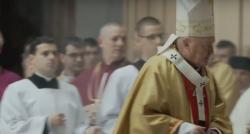By John Pickard, Brentwood Labour Party
One of the crucial elements in the upcoming elections in Poland, where the governing ‘Law and Justice’ Party is regarded as an upholder of traditional ‘Polish values’ may well be the role of the Catholic Church.
A recent TV programme on child abuse in the Church has created shock waves in Poland. The programme, Tell No One, has had a huge impact on the population of what is considered the most religious country in Eastern Europe. There are very harrowing scenes, including one in which a woman confronts a priest who had abused her when she was only seven years old. Now released on YouTube, it has been viewed more than 22m times, the overwhelming majority of these from Poland, where the population is only 38m.
Predictably, some right-wing politicians and clerics have denounced the film, calling it an attack on the right wing and on the Church, but others, including even leading figures in the Church, have publicly admitted the existence of an abusive Church ‘mafia’. The Polish primate, Archbishop Wojcciech Polak has apologised for ‘every wound inflicted by people of the Church’ but this has not stopped calls for a separation of Church and state in Poland. Other politicians are calling for a public inquiry. The new film on child abuse follows an earlier film called Clergy, which also showed priests in a very damaging light and which became the third most ever watched film in Polish cinema.
In March the Polish Church published its own report into abuse, identifying abuse cases involving nearly four hundred priests and over six hundred children between 1990 and 2018, although critics have suggested that this considerably understates the scale of the abuse. As it has been the practice in Ireland, the USA and everywhere else there has been abuse, the common practice among Church officials was to cover up abuse and to simply move abusive priests from one parish to another.
During the period of Poland’s domination by Russia prior to 1989, the Church was seen as one of the bulwarks of Polish national identity and resistance to Stalinism. The ruling regime found it difficult to directly suppress movements that were based on the Church or to ban meetings held in Church premises. As a result of those opposition movements and the perceived role of the Church, Catholicism received a boost around the period of the collapse of Stalinism and shortly afterwards. That is beginning to change now, however.
As it was in the Republic of Ireland until recently, the overwhelming majority of the population regard themselves as Catholic and the Church pervades all aspects of civil and political life. But there is a growing gulf between the young and the old. While 55 per cent of adults over 40 attend Church regularly, just over a quarter of those under 40 do so. ‘The discourse of the Church has become less and less adequate for young people’, according to Marta Kolodziejska, an academic at the Polish Academy of Sciences. (Financial Times, June 17).
It is difficult to say how much this scandal will affect the coming elections. In rural areas priests have openly called for votes for the Law and Justice Party, but their appeals may not cut much ice among younger voters, or even, as was the case in Ireland, with older voters. The Vatican has sent its chief child-abuse investigator, Archbishop Charles Sciluna, to Poland to paper over the cracks in the Church edifice, but it might be too late to prevent the slide of its influence and the ‘Irelandisation’ of the Church in Poland.
The film Tell No One is available on YouTube (with English subtitles) here.
June 19, 2019



